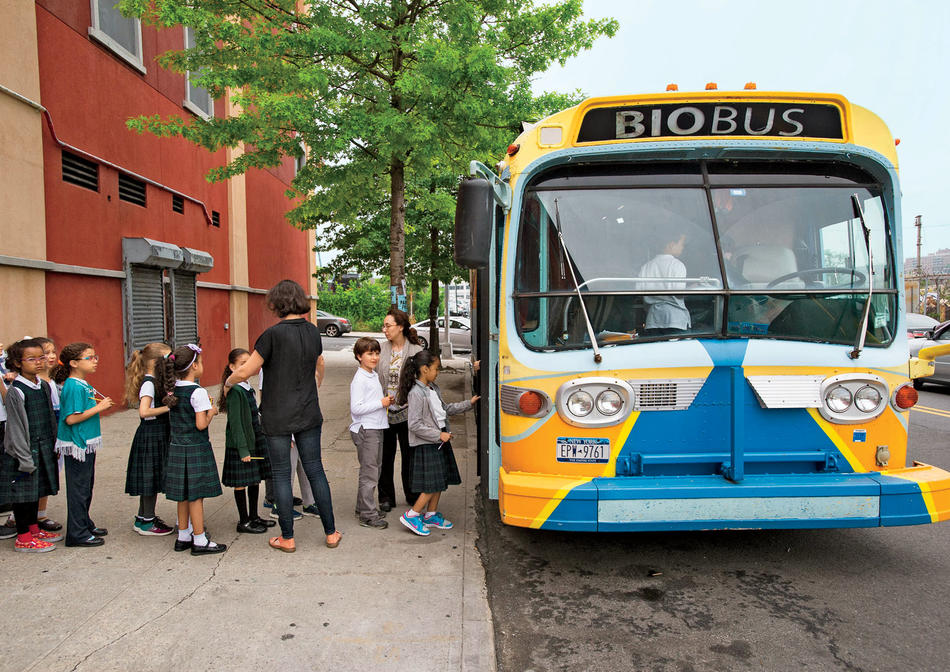Twenty third graders jostle for a close-up view of the tiny aquatic crustacean Daphnia. Adjusting microscopes, peering at monitors, and identifying body parts, they chirp about the “water fleas”:
They’re so cute!
Is it pregnant?
She gave birth! I saw it! One, two, three, four, five … she just had another one!
This encounter took place not in a conventional laboratory but aboard a thirty-four-foot-long Airstream trailer parked outside PS 208 on West 111th Street in Harlem. Welcome to BioBus, a community-focused mobile science lab and not-for-profit educational program founded and directed by Ben Dubin-Thaler ’00CC, ’08GSAS. In BioBus’s two vehicles — the Airstream and a converted city bus painted orange, yellow, and blue — Dubin-Thaler’s staff of scientists cruises the metropolitan area, bringing mind-expanding glimpses of the natural world to schoolchildren.
“I can see kids’ minds changing in a forty-five-minute stay on the bus,” says the lean, bearded, forty-year-old Dubin-Thaler (“You look like a skateboarder!” cried one of his PS 208 charges). “But it’s equally important that, beyond doing science, the kids meet scientists from Columbia and other institutions. That’s how barriers fall.”
BioBus’s grassroots approach stems from Dubin-Thaler’s activist bent. “I’m trying to redefine the scientific community,” he says. “Science is for everyone. There’s no us and them. Climate change, for instance: we’ve all got to solve it.”
Dubin-Thaler was raised in Philadelphia and comes from a long line of Columbians, starting with his great-grandfather Meyer Jacobstein 1904CC, a congressman from western New York in the 1920s, and extending to his father, Jon Thaler ’67CC, ’72GSAS; his uncle Toby Thaler ’72CC; and his brother, Alex Thaler ’04CC. But Dubin-Thaler says it was Columbia’s activist culture, not family tradition, that drew him to Morningside. For him, activism meant breaking down boundaries. As a grad student in biology, he would open his lab to visitors, from University staff to “kids I’d met playing roller hockey in the park,” in an attempt to share his fascination with the widest possible audience.
Ever since high school, when he interned at a mobile-science program called the Physics Van at the University of Illinois, Dubin-Thaler had longed for a way to meld a teaching career with community service. His eureka moment came as he was completing his doctorate. “One of the things that kept me sane in graduate school was performing with an anti-consumerist political-theater group called Reverend Billy and the Church of Stop Shopping,” he recalls. In 2004, while Dubin-Thaler was briefly touring California with the group in a refurbished San Francisco city bus, one of his compatriots remarked, “Hey, this bus would make an amazing bookmobile!” Dubin-Thaler agreed, but he had a slightly different plan.
With a chunk of his savings and some help from family and friends, he bought a used bus and had it converted into a lab. In 2007, BioBus was born. Today, through a partnership with the Zuckerman Institute, it is headquartered at the Jerome L. Greene Science Center, home of the Education Lab, where motivated BioBus students can work on long-term projects with Columbia scientists. With two vehicles and nearly thirty staff members, the BioBus program reaches thirty thousand kids each year.
These days, whenever Dubin-Thaler feels overwhelmed by the day-to-day work of keeping BioBus rolling, he’ll join a trip out to a school to “see what’s up” and connect with the kids, whose access to science education, in his view, is essential to solving problems, locally and globally. “The message is clear,” he says. “We’re all in this together.”
This article appears in the Summer 2019 print edition of Columbia Magazine with the title "Microscopes for the People."



